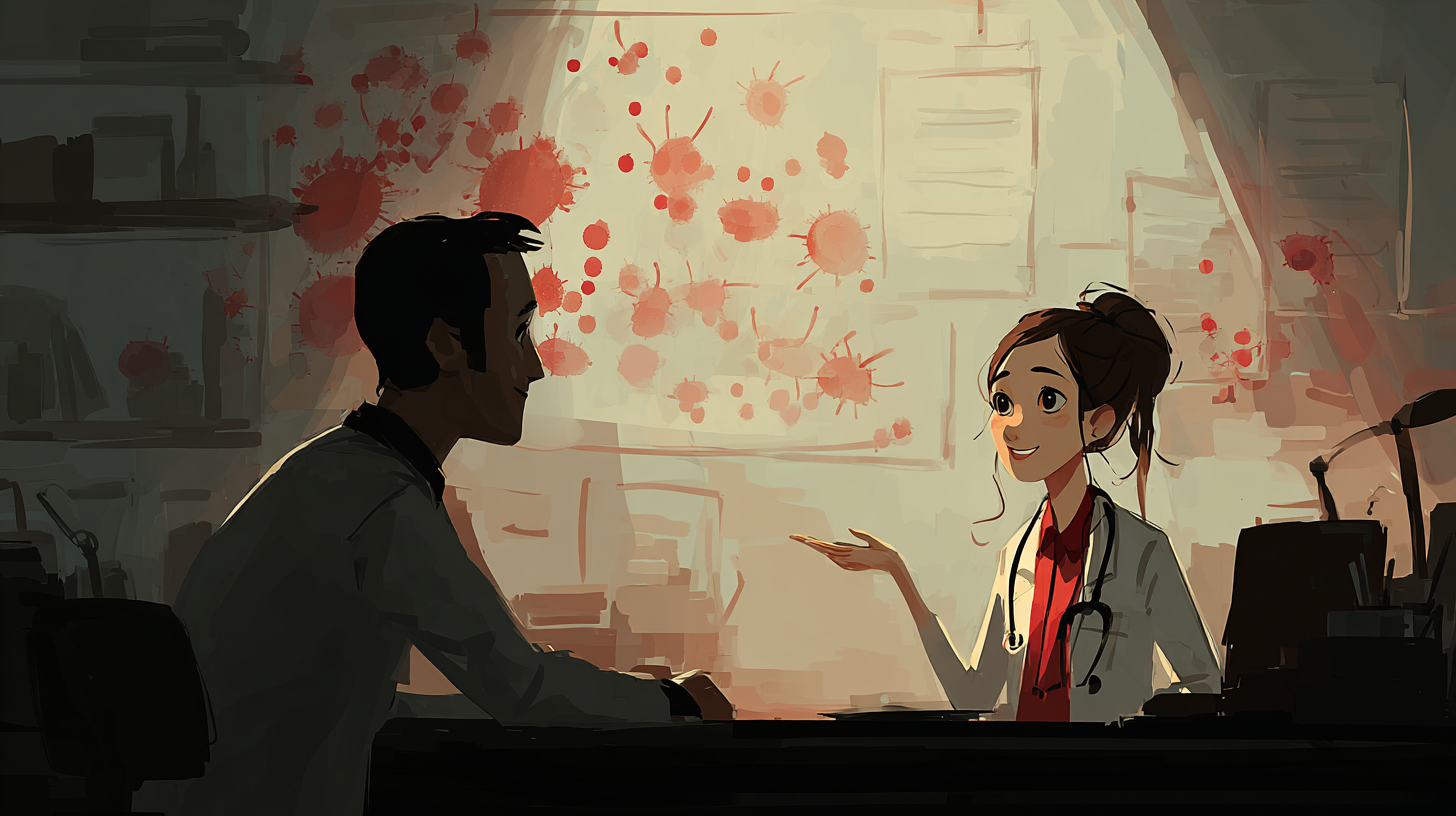A medicine that kills germs that make you sick.
病気のばい菌をやっつける薬のこと。
以下は英単語 “antibiotic” に関するストーリー型学習コンテンツです。まずは大枠の意味を理解して最後の文章で確認しましょう。
「antibiotic」の主な意味(main meaning)
| 品詞 | 意味(簡潔) | 発音記号 | 英語例文 |
|---|---|---|---|
| 名詞 | 細菌を殺す薬(抗生物質) | /ˌæn.ti.baɪˈɒ.tɪk/ | The doctor prescribed an antibiotic for her infection. |
「antibiotic」の語源(etymology)
「antibiotic」はギリシャ語の「anti-(反対)」と「bios(命・生命)」から来ています。
つまり、「命に逆らう=細菌などの有害な生命を殺すもの」というイメージです。
「antibiotic」の類義語(synonyms)
| 類義語 | 英語例文 |
|---|---|
| medicine | I took some medicine for my cold. |
| drug | This drug helps reduce fever and pain. |
| remedy | Honey and lemon are a natural remedy for sore throat. |
| penicillin | He is allergic to penicillin, a common antibiotic. |
「antibiotic」の反義語(antonyms)
| 反義語 | 英語例文 |
|---|---|
| virus | Antibiotics do not work against a virus like the flu. |
| vaccine | A vaccine prevents infection, not treats it like antibiotics. |
「antibiotic」のコロケーション(collocations)
| コロケーション | 英語例文 |
|---|---|
| take antibiotics | You should not take antibiotics for a common cold. |
| antibiotic treatment | She is under antibiotic treatment for pneumonia. |
| antibiotic resistance | Overuse of medicine can lead to antibiotic resistance. |
| broad-spectrum antibiotic | The doctor gave him a broad-spectrum antibiotic. |
| prescribe antibiotics | Doctors sometimes prescribe antibiotics unnecessarily. |
「antibiotic」の2項表現(binomials)
| 2項表現 | 英語例文 |
|---|---|
| health and medicine | Learning about health and medicine is important for everyone. |
| drugs and antibiotics | Some bacteria are resistant to drugs and antibiotics. |
英語ストーリー(english story)
Title: The Office Flu Outbreak
One Monday morning, several employees at Lisa’s office were sneezing and coughing. It seemed like a flu outbreak was spreading fast. Lisa, the team leader, called a quick meeting.
“I think many of you are getting sick. Please go to the doctor if you feel unwell,” she said.
The next day, Tom visited a clinic. The doctor explained, “You have a viral infection. You don’t need an antibiotic. Antibiotics are used for bacterial infections, not viruses.”
Tom remembered his mother always gave him medicine for colds, but he now understood that not all drugs help every illness.
Meanwhile, Lisa searched online and read about antibiotic resistance. She learned that taking antibiotics too often, especially for the wrong reasons, can make them stop working in the future. “Wow, this is serious,” she thought.
At the office, the HR department sent out an email titled “Health and Medicine Tips.” It included advice such as washing hands, staying home when sick, and avoiding unnecessary antibiotic treatment.
One employee, Maya, shared her experience. “Last year, I had pneumonia. The doctor gave me a broad-spectrum antibiotic, and I got better in a week. But he also warned me not to use antibiotics for small problems.”
After a week, most of the team recovered without antibiotics. Lisa was glad she took action early. She also updated the company health policy to include more education on drugs and antibiotics.
Now, her team understood how to stay healthy—and how to use remedies wisely.
和訳
タイトル:オフィスのインフルエンザ流行
ある月曜日の朝、リサのオフィスでは何人かの社員がくしゃみやせきをしていました。どうやらインフルエンザが広がっているようでした。チームリーダーのリサはすぐにミーティングを開きました。
「体調が悪い人は無理せず病院に行ってください」と彼女は言いました。
翌日、トムはクリニックを訪ねました。医者は説明しました。「あなたはウイルス(virus)による感染です。**抗生物質(antibiotic)**は必要ありません。抗生物質は細菌に効く薬で、ウイルスには効きません。」
トムは風邪をひいた時、いつも母が**薬(medicine)をくれていたのを思い出しましたが、今では病気ごとに薬(drug)**の種類が違うことがわかりました。
そのころ、リサは「抗生物質耐性(antibiotic resistance)」についてネットで調べていました。抗生物質を間違って使いすぎると、将来効かなくなることがあると知り、「これは大変だ」と思いました。
オフィスでは、人事部が「**健康と薬(health and medicine)のヒント」というタイトルのメールを送信しました。手洗いや、体調が悪いときは家にいること、そして不必要な抗生物質治療(antibiotic treatment)**を避けることなどが書かれていました。
社員の一人、マヤは自身の経験を話しました。「去年、肺炎にかかりました。医者は**広範囲抗生物質(broad-spectrum antibiotic)**を出してくれて、1週間で治りました。でも、軽い病気に使ってはいけないとも言われました。」
1週間後、ほとんどの社員は抗生物質なしで回復しました。リサは早めに対処したことに安心しました。そして会社の健康方針に**薬と抗生物質(drugs and antibiotics)**の正しい知識を加えました。
今では、みんな健康でいる方法と**自然療法(remedy)**の上手な使い方を理解しています。
「antibiotic」のQ&A
- Q抗生物質(antibiotic)とmedicine(薬)は同じ意味ですか?
- A
どちらも病気を治すための薬を指しますが、「medicine」はもっと広い意味で、風邪薬や痛み止めなどすべての薬を含みます。「antibiotic」は特に細菌を殺す薬(抗生物質)を指します。
- Qdrugとantibioticの違いは何ですか?
- A
「drug」は薬全体を指す言葉で、痛み止め、精神薬、ワクチンなども含みます。「antibiotic」はその中でも細菌をやっつける特別な薬のことです。
- Qremedy(レメディ)はantibioticの代わりになりますか?
- A
「remedy」は自然な方法や家庭の療法(例:はちみつレモン)を含む幅広い言葉で、軽い症状には効果がありますが、細菌感染には「antibiotic」のような医学的な薬が必要な場合があります。
- Qpenicillinはantibioticの一種ですか?
- A
はい、「penicillin(ペニシリン)」は最初に発見された抗生物質の一つで、たくさんの細菌に効く代表的なantibioticです。
- Qantibioticの反対の意味になる言葉は何ですか?
- A
「virus(ウイルス)」や「vaccine(ワクチン)」が反対のイメージで使われます。antibioticは細菌に効く薬であり、ウイルスには効きません。一方、ワクチンは病気を予防するもので、治すものではありません。
- Q「take antibiotics」はどんな意味ですか?
- A
「抗生物質を飲む・使う」という意味です。病気のときに医者から出されたantibioticを使うことを表します。
- Q「antibiotic treatment」とは何ですか?
- A
「抗生物質による治療」のことです。細菌感染に対して抗生物質を使う治療法を指します。
- Q「antibiotic resistance」ってどういう意味ですか?
- A
「抗生物質が効かなくなること」です。薬を使いすぎると、細菌がその薬に強くなり、効かなくなることがあります。
- Q「broad-spectrum antibiotic」は何が特別ですか?
- A
「広い範囲の細菌に効く抗生物質」です。どの細菌に感染しているかまだ分からないときに使われることが多いです。
- Q「prescribe antibiotics」はどういう意味ですか?
- A
「抗生物質を処方する」という意味で、医者が患者に抗生物質を出すときに使われます。



コメント